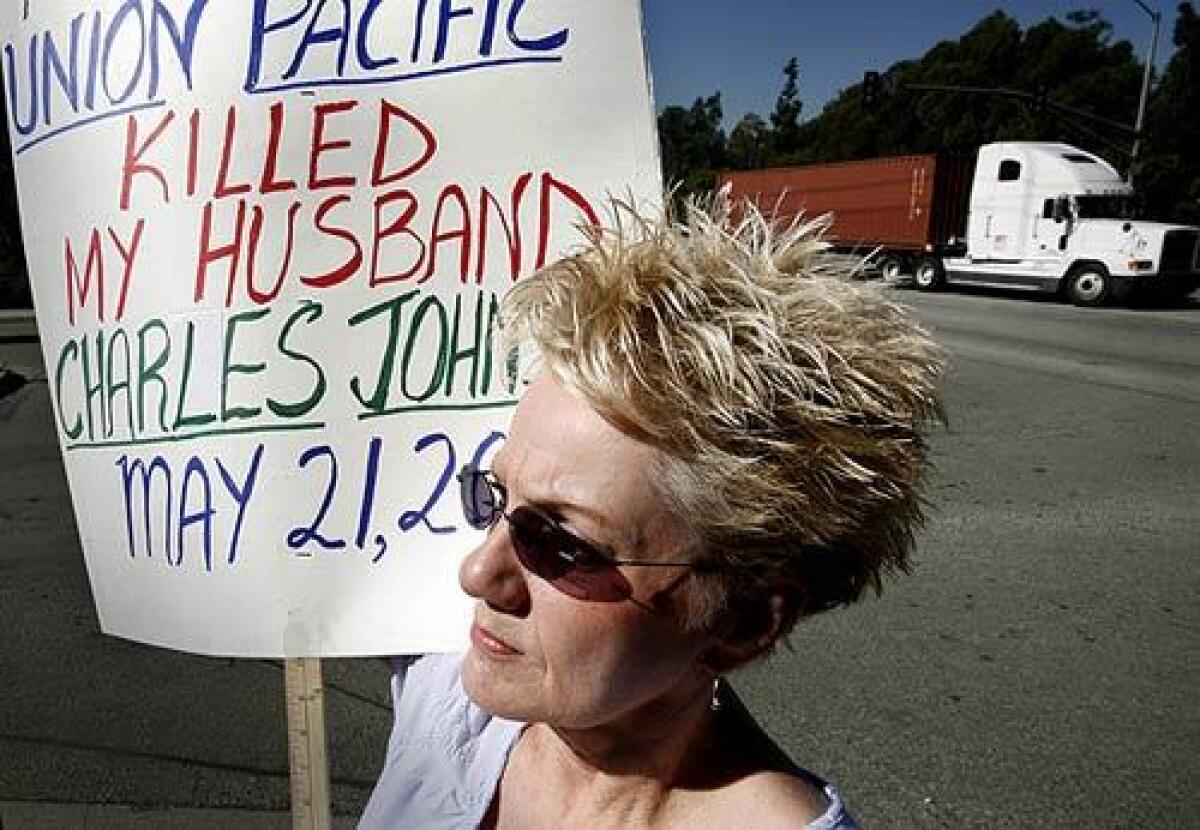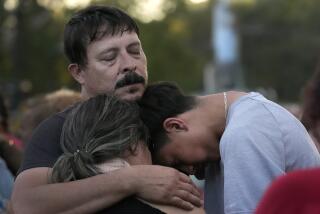In Wilmington, a family keeps a lonely vigil for a dead husband and father

- Share via
On a dull Wilmington corner, where big rigs shudder by, Pat Johnson stands in protest.
A homemade sign, black and blue marker stenciled on white poster board, explains: “In loving memory of my husband Charles Johnson who died at UP from neglect.”
Johnson is unsure what, if anything, the public vigils she and her two daughters keep outside the Union Pacific rail yard will do. Offer closure, maybe. Acknowledgment of what she and her daughters have lost. Time to grieve.
But she knows what they won’t do: Bring back Chuck, who suffered a heart attack, toppled nearly 4 feet from a train platform and died on the asphalt. Her sorrow has brought her here, to make known the death of her husband of 40 years.
Nearby, a small table holds photos of the man -- holding a moon-faced baby girl, looking bemusedly up from a newspaper 40 years ago, back when he had hair. The Johnsons were each other’s best friends. Their home in Huntington Beach was the cool hangout for their girls and their friends. A man’s man, Chuck would wander Home Depot’s aisles ogling tools and fuss over his 1950 Triumph 650 motorcycle.
Johnson knows the official version of what happened to Chuck. But that doesn’t stop her from wondering about that night, if something went wrong, if more could have been done. The 405 Freeway onramp across the street doesn’t look comforting, but the 63-year-old grandmother and her daughters “feel better when we’re here,” Johnson says. “Maybe it’s a way of venting anger, venting emotions.
“Will we make a difference? I don’t know.”
Chuck was working as a Union Pacific ground man on track No. 805 on May 21, 2007, climbing up and down train cars, securing freight deposited by cranes. A crane operator last saw him standing on a platform about 8:35 p.m. Moments later, a worker spied a flash of orange reflector vest between two cars. “Ground man down!” he shouted into his radio. Paramedics were called at 8:46.
Chuck, according to witnesses and official incident reports, was alive and responsive. He wiggled his fingers for his buddies. It’s unclear how long he lay there, bleeding from the back of his head, until the paramedics arrived at 8:57 p.m. Chuck was pronounced dead at 9:15 p.m.
Word of Chuck’s death didn’t spread immediately; when the overnight shift arrived an hour or so later, he lay there still. That night, many of the men, shaken by their fallen colleague, walked off the job in protest.
The Los Angeles County coroner’s report is unequivocal: Charles Johnson, 63, his arteries severely blocked in several places, died of a heart attack triggered by physical activity. Three investigations into his death -- one by Union Pacific, a brief inquiry by Cal-OSHA and another by the Federal Railroad Administration -- echoed the coroner’s report.
Yet Johnson believes that something else went wrong, a contention she says was bolstered by Chuck’s co-workers.
The paramedics had trouble finding Chuck in the massive yard, one former employee told her. And Union Pacific management, employees say, didn’t seem to have an emergency plan. Rail yard officials declined to respond to those allegations.
Some of his co-workers said they couldn’t be sure the train cars Chuck was loading were secured, as mandated by federal safety regulations. With no brakes on, a crane delivering 20-foot containers could slam the cars with enough force to knock a man to the ground.
Company spokeswoman Zoe Richmond said she could not comment on workers’ specific allegations but stressed, “Safety is our No. 1 priority at Union Pacific.” The Wilmington facility, she said, has a strong safety record.
“Was there anything that could have been done?” Richmond said. “From the coroner’s report, it doesn’t seem like it.”
Union Pacific paid the funeral expenses. She described it as a “tragic situation.”
Johnson retained attorney Anthony Petru, who specializes in railroad law, but she said he told her the case would not be “cost-effective” to pursue. He no longer represents her.
Under federal law, Johnson must prove that the railroad was negligent or violated safety regulations that led to her husband’s death to win a lawsuit. Although most federal railroad cases are won by railroad employee plaintiffs, Petru said, “It’s not a slam-dunk.”
With the evidence and odds against her, Johnson soldiers on. She does it for Chuck, she says, and for the men he worked with, a couple of dozen of whom showed up at a modest memorial for him last spring. The outpouring of support surprised and comforted a family numb with grief.
“You don’t remember what it’s like to be happy,” said the Johnsons’ daughter Shannon Selof, 38. “We don’t want people to see us as crazy grieving widow and children. We want to do what’s right, and protect the other workers that work here. Nothing will bring my dad back . . . [but] it’s kind of one of those where you want to scream from the mountaintop: ‘Hey! This happened! Nothing was done!’ ”
And so Johnson protests. She lays in bed sometimes, asking Chuck if she’s doing the right thing. When Union Pacific workers contacted her, telling her their memories and fears, she says she had her answer.
Even now, nearly two years later, Union Pacific workers in fluorescent orange vests stop at the corner that Johnson has claimed, listening, bending down to offer hugs. Knowing that Pat Johnson had no income, Chuck’s former co-workers collected $2,800 for her.
Since Chuck passed away, a railroad claims agent visited, called and came to the memorial seeking Johnson’s signature on a liability waiver, she said. Union Pacific spokeswoman Richmond said it is not “standard policy” to have an employee’s widow sign legal documents.
Other than a security guard eyeing her outside Union Pacific’s gates, Johnson hasn’t communicated with the railroad since mid-2007.
So they return to their corner -- Johnson, Shannon, Johnson’s older daughter Lee, Johnson’s sister, Lee’s boyfriend -- a tight little band. Some tractor-trailer drivers honk their horns, a few men wave from their cabs as they pull into the rail yard gate.
When the traffic din fades, you can hear Lee calling on her battery-operated megaphone: “Don’t let this be your family! Where is the justice for Charles Johnson?”
susannah.rosenblatt
@latimes.com
More to Read
Sign up for Essential California
The most important California stories and recommendations in your inbox every morning.
You may occasionally receive promotional content from the Los Angeles Times.











